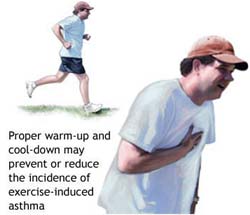Asthma and exerciseHaving asthma shouldn’t stop you from getting involved in sports or physical activity, whether just for fun or more competitively. In fact, many athletes have asthma. Exercise is great for health and well-being. Choose an activity you enjoy and aim for at least 30 minutes of moderately intense physical activity every day or most days. The symptoms’ severity usually depend on how long and hard you exercise and how dry and cool the air is. However, you can still manage to prevent the symptoms and be ready in case they occure.
 How to treat a flare-up
How to treat a flare-up- Stop what you’re doing.
- Follow your asthma action plan. If you don’t have an action plan, take 4 separate puffs of a blue/grey reliever.
- Only return to your exercise or activity if your breathing returns to normal.
- If the symptoms don’t go away, or if they return while you’re exercising again, use your reliever as before. Don’t do any more exercise that day.
- If the symptoms still don’t go away, follow your asthma action plan – you may need see your doctor.
- Competitive sports
If you participate in competitive sports, make sure you and your doctor know which asthma medicines you are allowed to take.
.
Exercise tips- There are some things you can do:
- Get as fit as possible – the fitter you are, the harder you need to work before symptoms start.
- Exercise in a place that is warm and humid – avoid cold, dry air if possible.
- Avoid exercising where there are high levels of pollens, dusts, fumes or pollution.
- Breathe through your nose when you exercise.
- Do a proper warm-up and cool-down.
- Keep your reliever (e.g. Ventolin, Asmol, Bricanyl) handy and be prepared if your asthma flares up.
- If your asthma does flare up, don’t ignore it or hope the symptoms will go away by themselves.
